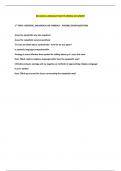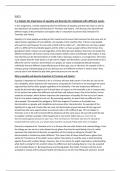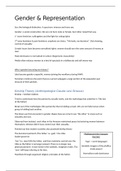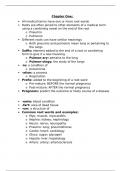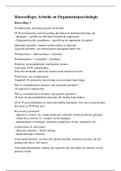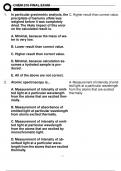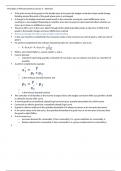29 oktober 2020
The evolution of influenza viruses and host immune responses
Pandemic: originate from animals and is transmitted to humans
→ from human to human : it is spread around the world
After pandemics that virus become a seasonal flu : seasonal flu’s are always present in
humans
- you get infected every 5-10 years with a seasonal influenza virus
Escaping immunity Influenza:
- hemagglutinin: binding to surface of the cell and pulling the virus inside
- primary target of our immune system
- neuraminidase protein: cutting virus free when it want to go out of the cell
- also important for penetrating mucus
- Antibodies target the head of the proteins and influenza mutates (small substitutions
are enough) the antibody binding site to the head (7 AA)→ Igs can not longer
recognize the virus = Antigenic drift: mutations in H & N
Antigenic variation or change: Virus changes → every time another dominant virus
Why is influenza punctuated? You would expect that at some level the virus has all the
good characteristics
→ Because of the timing and nature of selection, only large differences matter
Why only every few years new influenza viruses? Only 1 substitution can lead to new
variants.
→ The timing of antibody selection rarely coincides with virus replication (only antigenic
changes when you have pressure of antibodies)
→ Accumulation of population immunity is key, but it takes time (only antigenic changes
when you have encountered influenza before)
→ Deleterious mutations: Perhaps because the virus is making good and bad mutations and
he is waiting till he get a good mutation and then emerge
→ Perhaps because all mutations are on the receptor binding site and there need to be a
good balance between binding to a receptor and escaping the immune system.
These can be also true → you have to test this models, but the problem is that evolution can
become too slow
Studies make all the time 2 assumptions:
1. Evolution is beneficial for the virus
2. Immunity comes from strong and a constant antibody response
→ Not true!
Within-host variation: is very low, so antigenic variation within the host is low
Adults with influenza → NGS and look at the variation in the virus inside of that people
- They had influenza before, because they are adults & ⅔ was vaccinated
- Some had antigenic variation (1/350)
, - A few more had some mutations, but not in the antibody binding region
Thus, antigenic change in patients (vaccinated or now) is rare
3rd question: how can we reconcile strong population-level selection with weak
within-host selection? So there is selection in the population, but the virus does not have
antigenic variation within the host?
Hypothesis: influenza evolution is limited by the asynchrony between virus replication &
antibody selection pressure
- 1st Influenza infection (naive) → you have to wait until GC response kicks in (7-10
days), so virus can replicate
- When you have had Influenza before (experienced)→ we make faster antibodies
(EF response), but this takes at least 3 days, so the virus can still replicate first
→ Thus, most of the virus replication happens in the absence of antibodies
Virus shedding : when you have the highest viral load → highest transmission!
Within-host model of virus evolution:
Virus infects cells → copies → released → infect other cells
- new variants are made by the virus polymerase that is sloppy and makes roughly 1
mutation per replication per virus
- Antibody response after day 7: we expect that there are new variants,
because the polymerase makes a lot of variants, but there are very less
variants (under threshold) → rare
- Antibody response all the time: there would be new variants in every host, but
this is not the case
- Delayed in antibody response (day 2): variants are above threshold, so are
detectable, but they reach at they 6 : the time after transmission can occur, so
transmission is unlikely and sequencing become difficult
- HIV : produces new variants in every person : it is doing that in the presence of
antibody selection (antibodies are present all the time), but in the case of influenza :
not
We don’t have a constant antibody response, how does protection work?
- Innate immunity
- T cells
- IgA (at mucosal surfaces): act at point of infection, before virus replication
Barrier for IgA
new variants are made in every person, but they are very rare. But a lot of people get
influenza, so it happens:
, - someone's sneezes wild variants & mutants variants → a lot of virus is trapped by
mucus, but some (1-10) get through → When you are infected before you have IgA in
the mucus → IgA can bind wildtype (IgA bottleneck), but not new variant, so there is
a benefit for the new variant → you get infected with the new variant
→ protection/selection depends on cross-reactivity of wild type & variant viruses
Assume:
- last infection was by red virus → exposed to another red virus : antigenic difference
is small : your body will recognize this virus → you won’t get infected
- last infection was by red virus → exposed to blue virus : antigenic difference is large:
no neutralization by IgA, so this blue virus has a strong advantage : you will get
infected
→ drift within clusters
In mathematical model you can assume everybody is naïve or have exposed
- naive: not so much antigenic change (no one is immune to virus)
- immediate recall response: large antigenic changes (we do not see this in the
population) → this is HIV
- mucosal antibodies with delayed recall response: antigenic change is rare
THUS: when you have encountered influenza before is key for virus evolution,
because when everyone is naive there is no antigenic change
BUT: you can get exactly the same infection with the identical virus that you have
encountered before: so influenza is difficult.
Key thing to remember: Timing is everything!
Antigenic evolution: you need antibody pressure and antibody pressure is not there all the
time
- immunocompromised people: weakened immune system: can be infected with
influenza for weeks & months → virus can evolve → antigenic mutations
- HIV patients: virus replicating & strong antibody response → more antigenic
mutations?
The evolution of influenza viruses and host immune responses
Pandemic: originate from animals and is transmitted to humans
→ from human to human : it is spread around the world
After pandemics that virus become a seasonal flu : seasonal flu’s are always present in
humans
- you get infected every 5-10 years with a seasonal influenza virus
Escaping immunity Influenza:
- hemagglutinin: binding to surface of the cell and pulling the virus inside
- primary target of our immune system
- neuraminidase protein: cutting virus free when it want to go out of the cell
- also important for penetrating mucus
- Antibodies target the head of the proteins and influenza mutates (small substitutions
are enough) the antibody binding site to the head (7 AA)→ Igs can not longer
recognize the virus = Antigenic drift: mutations in H & N
Antigenic variation or change: Virus changes → every time another dominant virus
Why is influenza punctuated? You would expect that at some level the virus has all the
good characteristics
→ Because of the timing and nature of selection, only large differences matter
Why only every few years new influenza viruses? Only 1 substitution can lead to new
variants.
→ The timing of antibody selection rarely coincides with virus replication (only antigenic
changes when you have pressure of antibodies)
→ Accumulation of population immunity is key, but it takes time (only antigenic changes
when you have encountered influenza before)
→ Deleterious mutations: Perhaps because the virus is making good and bad mutations and
he is waiting till he get a good mutation and then emerge
→ Perhaps because all mutations are on the receptor binding site and there need to be a
good balance between binding to a receptor and escaping the immune system.
These can be also true → you have to test this models, but the problem is that evolution can
become too slow
Studies make all the time 2 assumptions:
1. Evolution is beneficial for the virus
2. Immunity comes from strong and a constant antibody response
→ Not true!
Within-host variation: is very low, so antigenic variation within the host is low
Adults with influenza → NGS and look at the variation in the virus inside of that people
- They had influenza before, because they are adults & ⅔ was vaccinated
- Some had antigenic variation (1/350)
, - A few more had some mutations, but not in the antibody binding region
Thus, antigenic change in patients (vaccinated or now) is rare
3rd question: how can we reconcile strong population-level selection with weak
within-host selection? So there is selection in the population, but the virus does not have
antigenic variation within the host?
Hypothesis: influenza evolution is limited by the asynchrony between virus replication &
antibody selection pressure
- 1st Influenza infection (naive) → you have to wait until GC response kicks in (7-10
days), so virus can replicate
- When you have had Influenza before (experienced)→ we make faster antibodies
(EF response), but this takes at least 3 days, so the virus can still replicate first
→ Thus, most of the virus replication happens in the absence of antibodies
Virus shedding : when you have the highest viral load → highest transmission!
Within-host model of virus evolution:
Virus infects cells → copies → released → infect other cells
- new variants are made by the virus polymerase that is sloppy and makes roughly 1
mutation per replication per virus
- Antibody response after day 7: we expect that there are new variants,
because the polymerase makes a lot of variants, but there are very less
variants (under threshold) → rare
- Antibody response all the time: there would be new variants in every host, but
this is not the case
- Delayed in antibody response (day 2): variants are above threshold, so are
detectable, but they reach at they 6 : the time after transmission can occur, so
transmission is unlikely and sequencing become difficult
- HIV : produces new variants in every person : it is doing that in the presence of
antibody selection (antibodies are present all the time), but in the case of influenza :
not
We don’t have a constant antibody response, how does protection work?
- Innate immunity
- T cells
- IgA (at mucosal surfaces): act at point of infection, before virus replication
Barrier for IgA
new variants are made in every person, but they are very rare. But a lot of people get
influenza, so it happens:
, - someone's sneezes wild variants & mutants variants → a lot of virus is trapped by
mucus, but some (1-10) get through → When you are infected before you have IgA in
the mucus → IgA can bind wildtype (IgA bottleneck), but not new variant, so there is
a benefit for the new variant → you get infected with the new variant
→ protection/selection depends on cross-reactivity of wild type & variant viruses
Assume:
- last infection was by red virus → exposed to another red virus : antigenic difference
is small : your body will recognize this virus → you won’t get infected
- last infection was by red virus → exposed to blue virus : antigenic difference is large:
no neutralization by IgA, so this blue virus has a strong advantage : you will get
infected
→ drift within clusters
In mathematical model you can assume everybody is naïve or have exposed
- naive: not so much antigenic change (no one is immune to virus)
- immediate recall response: large antigenic changes (we do not see this in the
population) → this is HIV
- mucosal antibodies with delayed recall response: antigenic change is rare
THUS: when you have encountered influenza before is key for virus evolution,
because when everyone is naive there is no antigenic change
BUT: you can get exactly the same infection with the identical virus that you have
encountered before: so influenza is difficult.
Key thing to remember: Timing is everything!
Antigenic evolution: you need antibody pressure and antibody pressure is not there all the
time
- immunocompromised people: weakened immune system: can be infected with
influenza for weeks & months → virus can evolve → antigenic mutations
- HIV patients: virus replicating & strong antibody response → more antigenic
mutations?

